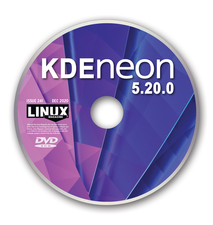On the DVD
On the DVD

KDE neon 5.20.0 and elementary OS 5.2
KDE neon 5.20.0
KDE neon User Edition 20201013 is the latest stable showcase of the Plasma desktop environment used in the KDE software compilation. It is the companion to the KDE neon Developer's Edition, which contains the very latest Plasma applications. The User Edition is ideal for those who want to see the latest in Plasma development, but want a degree of stability.
KDE neon exists because KDE development is divided into Framework, Plasma, and the Software Compilation (which used to be designated as KDE 4.x).These three areas used to release versions together, but the trouble was that each developed at its own pace. As a result, the version of Plasma released in the Software Compilation can sometimes be several versions behind the very latest one. KDE neon was begun so that interested users could be more up to date on Plasma development. Later, when neon became popular, the User Edition was created for those who wanted to keep informed, but also to have a measure of stability.
To create that stability, the User Edition uses the latest Long Term Support (LTS) version of Ubuntu – in this case, Ubuntu 20.04. Like all LTS releases, 20.04 will be supported with upgrades and security patches for five years.
[...]
Buy this article as PDF
(incl. VAT)
Buy Linux Magazine
Subscribe to our Linux Newsletters
Find Linux and Open Source Jobs
Subscribe to our ADMIN Newsletters
Support Our Work
Linux Magazine content is made possible with support from readers like you. Please consider contributing when you’ve found an article to be beneficial.

News
-
Two New Distros Adopt Enlightenment
MX Moksha and AV Linux 25 join ranks with Bodhi Linux and embrace the Enlightenment desktop.
-
Solus Linux 4.8 Removes Python 2
Solus Linux 4.8 has been released with the latest Linux kernel, updated desktops, and a key removal.
-
Zorin OS 18 Hits over a Million Downloads
If you doubt Linux isn't gaining popularity, you only have to look at Zorin OS's download numbers.
-
TUXEDO Computers Scraps Snapdragon X1E-Based Laptop
Due to issues with a Snapdragon CPU, TUXEDO Computers has cancelled its plans to release a laptop based on this elite hardware.
-
Debian Unleashes Debian Libre Live
Debian Libre Live keeps your machine free of proprietary software.
-
Valve Announces Pending Release of Steam Machine
Shout it to the heavens: Steam Machine, powered by Linux, is set to arrive in 2026.
-
Happy Birthday, ADMIN Magazine!
ADMIN is celebrating its 15th anniversary with issue #90.
-
Another Linux Malware Discovered
Russian hackers use Hyper-V to hide malware within Linux virtual machines.
-
TUXEDO Computers Announces a New InfinityBook
TUXEDO Computers is at it again with a new InfinityBook that will meet your professional and gaming needs.
-
SUSE Dives into the Agentic AI Pool
SUSE becomes the first open source company to adopt agentic AI with SUSE Enterprise Linux 16.

